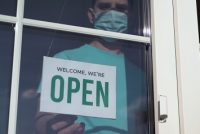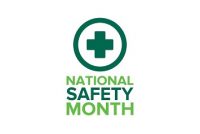Category: Special Topics in Safety Management
Safety is a process, and as such, needs to be managed. This section offers resources to create a viable safety program, sell it to senior management, train supervisors and employees in using it, and then track and report your progress. Look also for ways to advance your own skills in these areas, both for your current job, and those that follow.
Free Special Report: 50 Tips for More Effective Safety Training
No one is immune from the pandemic, but there are parts of our society that are experiencing greater loss and impact than others. One of the most dangerous effects is also one that is the hardest to identify—that of ideation, often fueled by feelings of injustice, a lack of control, and extreme depression and anxiety.
Since the COVID-19 pandemic started, employers have struggled to understand the Occupational Safety and Health Administration’s (OSHA) position on cloth face coverings and surgical masks, specifically whether the agency requires or recommends their use and whether they constitute personal protective equipment (PPE).
The National Institute for Occupational Safety and Health (NIOSH) recently collected safety and health information on cleaners and disinfectants that employers can use in their hazard communication programs. The NIOSH material includes a table of health hazards and protective measures for chemicals used as disinfectants.
On June 24, the California Division of Occupational Safety and Health (Cal/OSHA) announced the adoption of new workplace safety standards to protect agricultural employees who work at night. The new standards to protect agricultural workers who harvest, operate vehicles, and perform other work between sunset and sunrise are the first lighting standards in the nation.
The Massachusetts High Technology Council, a regional industry group, recently examined issues involved in reopening businesses and asking employees to return to work in the ongoing coronavirus disease 2019 (COVID-19) pandemic. A new report in the New England Journal of Medicine summarized their conclusions.
The Occupational Safety and Health Administration (OSHA) identified six standards in addition to the General Duty Clause of the Occupational Safety and Health Act (OSH Act) that apply to businesses reopening as shelter-in-place and stay-at-home orders begin lifting. The standards for personal protective equipment (PPE), 29 CFR §1910.132; respiratory protection, §1910.134; sanitation, §1910.141; hazard communication, […]
Before the World Health Organization declared a coronavirus disease 2019 (COVID-19) pandemic on March 11, workplace safety and health professionals already were looking at a future that included new technologies, nontraditional work arrangements, an aging and multigenerational workforce, impairment brought on by medical or recreational cannabis use, and workplace suicides and opioid overdoses.
Celebrated annually by the National Safety Council (NSC) since 1996, National Safety Month seeks to increase awareness of safety at work, at home, and within our communities.
As states lift stay-at-home orders and workplaces reopen, employers must plan for potential hazards of the ongoing coronavirus disease 2019 (COVID-19) pandemic and routine workplace hazards, the Occupational Safety and Health Administration (OSHA) reminded employers. COVID-19 is a respiratory illness caused by the SARS-CoV-2 virus. COVID-19 currently is widespread in most U.S. communities and considered […]
Exceptions from respiratory protection regulations allowing the use of surgical masks only apply to healthcare facilities and emergency medical services, the Occupational Safety and Health Administration (OSHA) reminded employers. Other employers must provide respirators, the agency explained in guidance discussing the differences among cloth face coverings, surgical masks, and respirators.










